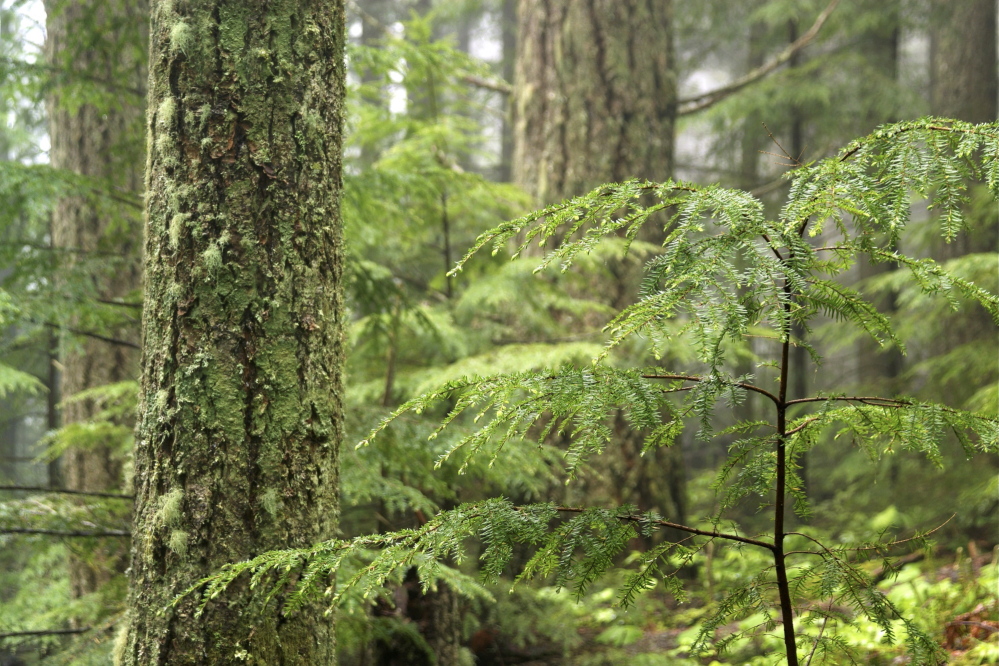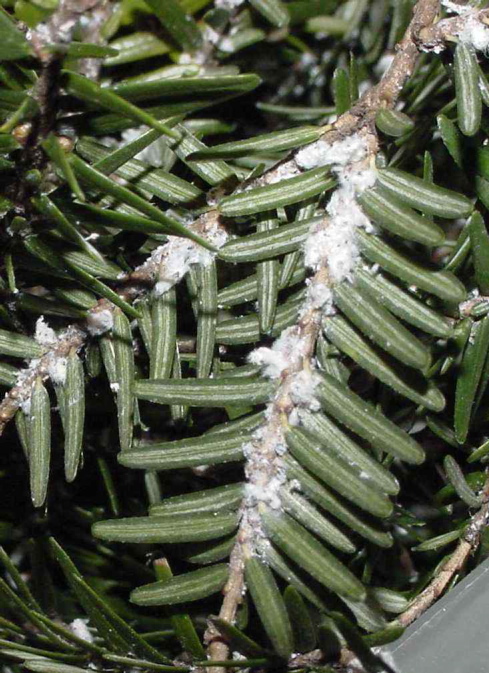The state has expanded the quarantine area for hemlock woolly adelgid to about 10 times its previous area, although the pest itself has not actually traveled that far.
A result of the expansion is that many of the state’s major nurseries – including Skillins, O’Donal’s, Estabrook’s, Piersons and Broadway Gardens – are quarantined and will not be able sell hemlocks to anyone who would take them outside the quarantine area. People who want to plant hemlocks outside the quarantine will have to buy them outside the quarantine area.
Carole Neal, an assistant state horticulturist, told a group of landscape professionals during a program at O’Donal’s Nursery last month that the adelgid still has not spread much beyond the immediate Maine coast, but that expanding the quarantine will protect the state’s two prime natural hemlock forests – one in western Maine that includes the northern tip of Cumberland County but is mostly in Franklin, Oxford and Somerset counties, and the other in inland Washington County and parts of Aroostook and Penobscot counties.
“That is a major resource that we are trying to protect,” Neal said.
The quarantine includes all of York, Sagadahoc and Lincoln counties; the towns of Litchfield and Pittston in Kennebec County; Auburn, Durham, Lewiston, Lisbon and Sabattus in Androscoggin County and all of Cumberland County except Baldwin, Sebago, Bridgton, Harrison, Naples and Casco.
“We tried to create a two-town buffer,” Neal said, which means that most of the towns covered by the quarantine still have not been hit by the woolly adelgid. She added that some towns were added because they are close to affected towns in New Hampshire.
Hemlocks sold from quarantined nurseries should still be free of the insect.
“Hemlock woolly adelgid is still considered a nursery pest, and we will continue to look for it during our visits,” Neal said.
Jeff O’Donal said that the hemlocks he sells will be adelgid-free, but people should ask the seller before they make a purchase.
Hemlock woolly adelgid is a sap-sucking insect similar to aphids that secrete a white, wool-like substance on the under-side of hemlock needles and branches. The adelgid goes through a crawling stage from March through July, when it is most easily spread, although evidence shows that so far it has moved mostly on transplanted trees.
Under the law, transporting a hemlock from the quarantine area to a non-quarantine area is a Class E crime, punishable by up to six months in jail and a $1,000 fine. Sellers would not be prosecuted, although they are expected to inform buyers about the law.
Pierson Landscaping, a wholesale nursery in Dayton, is going to have more problems than other companies dealing with the quarantine because its headquarters is in the quarantine area, but it grows its hemlocks at Western Maine Nurseries in Fryeburg, outside the quarantine area.
“Our plan is to dig them up there” in Fryeburg, Jake Pierson, nursery manager for the company, said in a telephone interview, “bring some percentage (to Dayton) and hold some up there, which is doable. We have people in place, but it will have an impact on cost” because of tending the dug hemlocks in Fryeburg.
If the company is delivering a load of plants to a nursery outside the quarantine, it will have to load the non-hemlocks on a truck in Dayton, drive to Fryeburg to pick up the hemlocks, and then go to the client.
He said he is going to have to question his hemlock customers about where they will be planting the trees. “If in the course of asking those questions, they think I’m being a pain in the butt, they might go to someone else outside of the quarantine zone who does not have to ask those questions, and I’ll lose all of their business.”
The pest has decimated hemlock forests from Connecticut south on the East Coast, but O’Donal said that hemlocks in Maine have done a good job of surviving the pest on their own. He said Maine is their natural habitat and the hemlocks are healthier here than they are farther south.
“This is a Zone 5 (most of coastal Maine and farther south) pest, not a Zone 4 pest,” O’Donal said. And he thinks it will not spread into the cooler, inland portions of Maine.
The adelgid is easily controllable in a landscape setting, especially with the low-growing hemlock varieties.
Neal said she has heard reports that cold temperatures this winter might set the adelgid back, but she is not sure that will happen.
Tom Atwell has been writing the Maine Gardener column since 2004. He is a freelance writer gardening in Cape Elizabeth and can be contacted at 767-2297 or at:
tomatwell@me.com
Send questions/comments to the editors.




Success. Please wait for the page to reload. If the page does not reload within 5 seconds, please refresh the page.
Enter your email and password to access comments.
Hi, to comment on stories you must . This profile is in addition to your subscription and website login.
Already have a commenting profile? .
Invalid username/password.
Please check your email to confirm and complete your registration.
Only subscribers are eligible to post comments. Please subscribe or login first for digital access. Here’s why.
Use the form below to reset your password. When you've submitted your account email, we will send an email with a reset code.